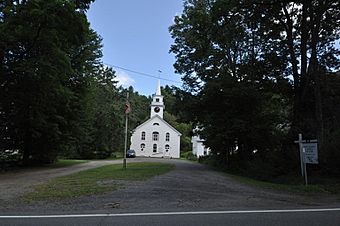Lyme Center Historic District facts for kids
Quick facts for kids |
|
|
Lyme Center Historic District
|
|

First Baptist Church
|
|
| Lua error in Module:Location_map at line 420: attempt to index field 'wikibase' (a nil value). | |
| Location | 34-55 Dorchester Rd., Lyme, New Hampshire |
|---|---|
| Area | 14 acres (5.7 ha) |
| Architectural style | Greek Revival |
| NRHP reference No. | 86003381 |
| Added to NRHP | March 31, 1987 |
The Lyme Center Historic District is a special area in Lyme, New Hampshire. It's like a time capsule showing how a small village grew. This historic district is mostly made up of homes. It stretches along Dorchester Road, near where it meets Baker Hill Road.
This village started growing in the early 1800s. It was an important spot because two main roads crossed here. These roads were Dorchester Road (east-west) and Baker Hill Road (north-south).
Discovering Lyme Center's History
Lyme Center was once known as Cook Village. This name came from James Cook, who first settled here in 1783. His family was very important in the village until the 1820s. James Cook owned and ran the early sawmills and gristmills. These mills helped the area grow. He guided the village's development until he passed away in 1814. Later, Cook's son opened the village's first tavern. This tavern served travelers who passed through on stagecoaches.
How the Village Grew
The village grew quickly in the 1820s. Many simple homes were built during this time. In 1830, the beautiful Baptist Church was constructed. Another important building is the Lyme Academy, built in 1839. It has a mix of older and newer styles.
Grant Brook runs next to Dorchester Road. This brook was a great source of power. It helped small industries, like a sawmill, to grow. Even though only the sawmill's foundations remain, it was key to the village's growth. This industry led to another building boom. This happened from the late 1800s to the early 1900s. Most houses in the district have a simple, classic style. The Beal-Pike House, built in 1857, is one of the most detailed homes.
What is a Historic District?
A historic district is a special area. It has buildings, places, or objects that are important to history. The Lyme Center Historic District was added to the National Register of Historic Places in 1987. This means it's officially recognized for its historical value.
 | Laphonza Butler |
 | Daisy Bates |
 | Elizabeth Piper Ensley |

